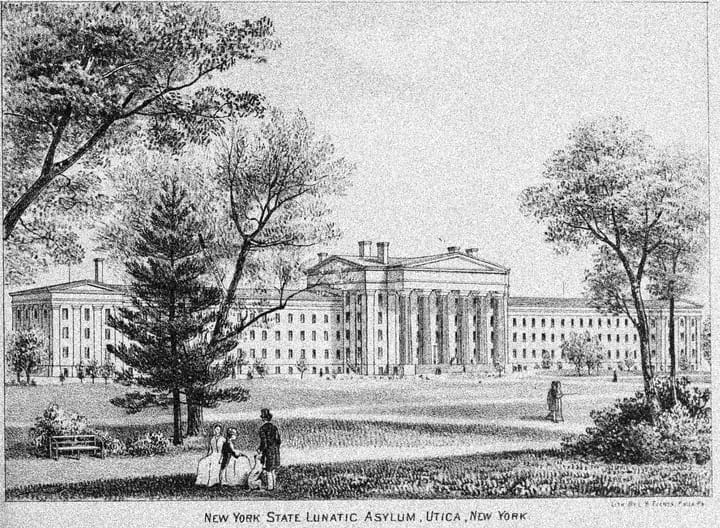Depressed Losers on the Verge of Destruction
The depressive’s neurons are appropriately withering, along with the possibility of a human future.

The psychiatrist Peter Kramer used to see patients, and he still remembers why. When a young woman visits him complaining of being unable to do the laundry, he’s nearly lovestruck: “Betty is terribly likable…. She is subtle, generous, self-effacing. In her presence, I feel coarse and overbearing. Betty understands the intricacies of relationships better than I do, has a wider tolerance for others’ foibles. How lucky I am to be having this conversation.” But it doesn’t take long for Kramer to come back to his senses: “when I am charmed, I think depression.” And by depression, he means not the characteristics of depressive behavior but rather “glial cells retreating…, neurons withering, [a] shrunken hippocampus and disordered prefrontal cortex.” This is because Kramer, knowing that depression is a brain disease, a problem of neuronal resilience, has trained himself to see beyond the person and into the brain. “No need to look forward to the face,” he proudly claims. Just as a “cardiologist sees blocked arteries” when “hearing of chest pain,” so too does Kramer see “fragility, brittleness, lack of resilience, [and] a failure to heal” in Betty’s brain whilst being charmed by Betty’s self-deprecating persona.
Kramer is the guy, if you’re wondering, who insinuated that we ought to be putting Prozac in public drinking water, but let me be clear from the outset: though I disagree with his practical conclusions, I find most of his assertions about depression to be true in an admittedly flat and narrow way. His genealogy of heroic melancholy, dating back to Romanticism, forces us to confront the debilitating features of depression even in the tradition of thought that saw it as an anchor of creative individuality. His conception of depression as brain disease strikes me as generally correct: though I’ve never seen the fMRIs, it sounds pretty reasonable that “depression in the brain looks eerily like depression in the person.” And though his predictable emphasis on genetic predisposition as the cause of depression is misguided, his understanding of the relationship between predisposition and environment is not objectionable. Indeed, if we replace “genes” with the more general “predisposition” in what follows, his etiology of depression is easily reconcilable with psychoanalysis:
The genes create adverse environments, as when they lead to a temperament that the culture fails to reward. Ordinary environments become adverse when interpreted through the personality shaped by the genes, as when someone needs more social stability and predictability than the culture tends to provide.
In what follows, I will take as roughly accurate Kramer’s assertion that depression is a disease evident in withering and disordered brain function that is traceable more to predisposition than environmental factors. One can agree with all of this, however, while still wondering about the nature of the purportedly “ordinary environment” in the previous passage. What social stability and predictability does contemporary culture provide? Or better, what in our ordinary environment is destabilizing to people whom we call depressed?
The philosopher Byung Chul-Han offers a simple answer: positivity. For Han, contemporary culture drowns us in an “excess of positivity.” It encourages us to be “achievement subjects.” The imperative under which we suffer is not, as in Freud’s time, that we ought to be good, but rather that we can do anything: if only you stay positive and work harder and faster, you can be a winner, too. In giving up on even trying to live up to this impossible ideal, depressives fall back into exhaustion, fatigue, and suffocation. In short, “achievement society,” which seeks to transform people into “autistic performance-machines,” “creates depressives and losers.”
Kramer, of course, would have none of this, but it doesn’t take much to reframe Han’s claim to accord with Kramerian etiology: the “ordinary environment” today demands unremitting positivity. Those with a predisposition that prevents them from participating in this positivity fall into depression, while those with proper resilience succeed in transforming themselves into autistic performance-machines. This is to say that successful adaptation to achievement society, which of course does not always translate to success within achievement society, is what prevents a lapse into depression.
Like Kramer, Han finds psychoanalysis of little use in making sense of contemporary depression:
Freudian psychoanalysis is only possible in repressive societies that found their organization on the negativity of prohibitions and commandments. Contemporary society, however, is a society of achievement; increasingly, it is shedding the negativity of prohibitions…. Freud’s psychic apparatus is dominated by negation, repression, and fear of transgression. The ego is a “seat of anxiety.” In contrast, the late-modern achievement-subject is poor in negation. It is a subject of affirmation.
Han is on the right track in linking psychoanalytic theory back to the conditions that generate it, but something is clearly amiss here. The imperative might be to “Be positive!”, but that imperative is experienced with great apprehension. Han himself emphasizes that the achievement subject is dominated by feelings of inadequacy and self-reproach, an “auto-aggression that often enough escalates into the violence of self-destruction.” It is difficult not to see in these feelings the return of a negativity repressed by the positivity of achievement society. Theodor Adorno dubbed this state “sickness unto health,” where any awareness or acknowledgment of one’s own suffering and unhappiness is repressed beneath a veneer of positivity.
But this raises an altogether different issue: a brief glance at either The Huffington Post or Breitbart News reveals no shortage of crass negativity at work in the culture industry. Indeed, in addition to “Be positive!”, an equally strong but opposing imperative seems to be “Be as negative and unthinking as you wish (toward a stereotyped other)!” In his focus on that which is already deemed pathological, Han simplifies the society-psyche relationship. The other-destructive negativity of paranoia and rage is no less in need of explanation than the self-destructive negativity of depression.
Perhaps there is no one nebulous category, such as “positivity,” within which we can fit the constraining imperatives of contemporary culture, no single category with which we can name the destabilizing forces within our “ordinary environment.” But for the sake of argument, I’ll push this line of thinking to a conclusion: if not positivity, what does the culture industry pedal as traditional morality did the “good?”
My proposal is the following: the obvious. A pernicious form of self-evidence is on display in both the ungrounded positivity abstracted from concrete conditions of life as well as the virulent negativity directed toward an uncomprehended other. This is an obviousness that tends to elicit argument and discussion, but only of the kind that does no more than confirm what people already take to be the case. The culture industry today might cultivate a wide range of niche markets, but it is unified in encouraging the belief that what is or ought to be is evidently so. The obvious is attractive because it is orienting: if something is obviously the case, then it’s not really a problem, and you know what to do. But why, then, would obviousness make us sick? Han makes a convincing case that positivity is a positive burden on us. What is burdensome about obviousness?
In short, the obvious constrains the pressing need to think. At the same time that we receive narrow platitudes that orient us to a particular way of life, all particular ways of life are being threatened by a tide of overwhelming irrationality that promises xenophobic violence, global war, and environmental catastrophe. In being fed and feeding others the obvious, we suffer from a lack of understanding, not of one another, but of the complex social mechanisms that seem to ensure that capitalist modernity will end in disaster. From this perspective, depression works as a signaling device. The breakdown of subjectivity at work in depression, as well as the avoidance of that breakdown through either the adaptation to autistic productivity or the paranoid-schizoid attack on otherness, is a product of the frustration involved in that lack of understanding. It is the unthought terror of capitalist society in the form of psychic pain.
What we diagnose as depression—again, a lack of “neuroresilience,” a problem of “glial cells retreating, and neurons withering,” and thus of observable bodily damage—is thus an effect of an openness, however unconscious, to the destructiveness of our society. For reasons that may well have more to do with predisposition than any environmental factors, autistic performance-subjects accept the obvious, and despite suffering from anxiety and depletion, are clear enough about what they are and ought to be doing. Depressives, by contrast, do not know what to do with themselves, and in this ambivalence there is an implicit rejection of the conformity-inducing obviousness propagated by our pseudo-culture, a rejection that can be seen in fMRI scans. At a moment when obviousness is preventing a full reckoning with the destructiveness of capitalist society, this rejection is mimetic: the depressive’s neurons are appropriately withering along with the possibility of a human future.
In addition to liking Betty, Kramer also cares about Betty: “I am afraid for Betty… She will fail to achieve milestones, or she will come to them late. If her career falters, if she needs to seek out real jobs, employers will find her a bargain, someone with more talent than her degrees indicate; they will underpay and underpromote her. She will have difficulty asserting herself on her own behalf. For Betty, work will become a source of constant strain.” We should be afraid for Betty as well: afraid that the deafening warning bell issuing from her head will be silenced by pharmaceuticals. That the obviousness under which she suffers will not be obviated because it has not been recognized as obviousness. And, finally, that she, like the rest of us, will suffer the material consequences of this non-recognition.
■
Antoine Doinel is in it for the family.



